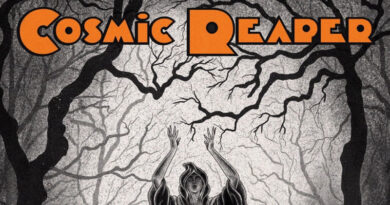Review: Acrimony ‘Chronicles Of Wode’
Acrimony were from Wales. They formed in 1991 and split in 2001. In the ten years they existed they were part of the burgeoning UK doom scene and released a handful of EPs and a couple of albums. At the tail end of last year, almost 30 years since the band formed, Burning World Records released Chronicles Of Wode: a stunning 5 LP (now sold out) and 3 CD box sets collecting the remastered-in-2019 Hymns To The Stone debut full length, also-remastered Tumuli Shroomaroom – sadly the band’s swan song, and a third CD collecting some non-album tracks and some never-before-heard rarities. If you check out the Burning World webstore you can also find vinyl, CD’s, shirts, and patches. So why all the fuss? Why release all this stuff from an obscure British band that put out so little and so long ago?
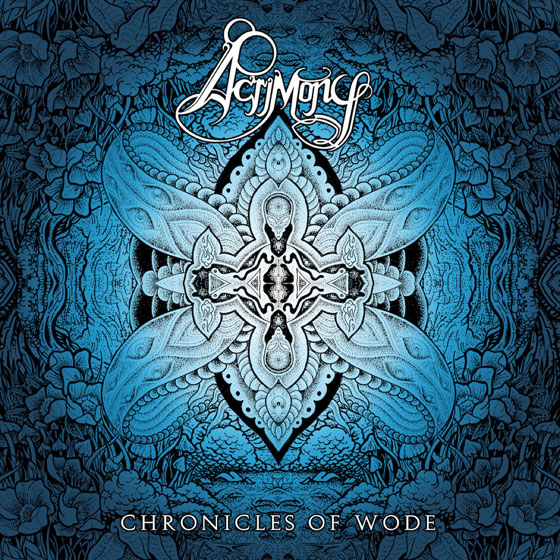
I started getting into doom and sludge just around the time Acrimony were splitting up, which is probably why they passed me by. Back then, the idea of down-tuned bands playing at very slow tempos wasn’t new, but it was still niche. It felt special and little bit arcane to me. Playing slow and low is a lot more accepted now. Not just accepted, but established, studied, and honed. Bands know how to dial in the perfect guitar tones, harness and evoke their influences, refine their aesthetics to perfection, and present everything in such a way that it fits neatly into a ready-made self-identified scene.
All that does a lot to diminish the sense of something special. It’s less mysterious and often feels, at least to me sometimes, sort of marketed and branded and contrived. I can only imagine what it was like for bands in the early 90s who loved heavy head music, turning their back on trends and trying to fit in somewhere as they took known sounds to someplace new and unexplored. It seems that Acrimony never found a wider audience, never found their scene, and like most pioneering acts, never got their due.
So what about now? Where do Acrimony fit in and what does this band mean to the various scenes and sub-genres we now know and recognise? If you’ve never heard of them, you’ll be wondering what they sound like. Well, as may be expected, there’s a massive dose of Sabbath in there, but it’s not just the mandatory huge riffs and slow tempos – it’s the atmosphere and characteristics of Sabbath that all too often are forgotten or ignored. A lot of metal bands namecheck Black Sabbath, but they miss out their diversity and intricacy, their sense of joy and wonder, their interest in other worlds, and their progressive experimentation.
The jazz and blues influences, delicate melodies, the folk spirit, heavy hippy trips, the clash of urban and rural, and the singular importance of a bunch of mates having fun while playing loud, tight and heavy through massive amps…
Acrimony drew from the very spirit of Sabbath, not just the heavy riffs or darkness. It’s strange and frustrating that such a pioneering band as the Sabs often get reduced to so little, but it’s fitting that Acrimony picked up on all the stuff that most people still don’t. The jazz and blues influences, delicate melodies, the folk spirit, heavy hippy trips, the clash of urban and rural, and the singular importance of a bunch of mates having fun while playing loud, tight and heavy through massive amps. Another major influence was Hawkwind, and just as Brock and Co. took a punk sensibility and jammed, tripped and threw in synth, FX and space rituals, Acrimony did the same with their Sabbath roots.
There are similarities to the likes of Kyuss and Sleep, and Acrimony were contemporaries of those bands, but their sound was somewhat more melodic and delicate with a distinctly psychedelic swing among a wash of fuzzy riffs and transcendental melodies. I don’t really like stoner jam bands that loop and loop over and over, but when you hear Acrimony building their jams, it’s always well judged and engaging because the songs are lean and well-structured, focused on the destination as well as the trip.
Listening to this band now and for the first time, it hits how un-self-conscious it is. It was clearly a new sound at the time, a new approach, and it’s uplifting to listen to something that sounds so lively and genuine. It’s the sound of a band that’s free because they’re not part of something that knows what it is yet. Like most bands that blazed a trail, there’s so much more to the music than the most obvious elements that those who follow pick up. It gets diluted and simplified and broken down so it’s more immediate, and what makes it special gets left behind and lost.
If you already know and love Acrimony, these reissues are not merely a nostalgia exercise. I wasn’t there at the time, but I listened to both the original masters and the remasters and the difference in sound is amazing. Of course, sometimes you’re always going to prefer the original because that’s the one you know and love, but these remasters sound vibrant, fresh, and hugely heavy. It’s evident that real care has been taken to preserve the original dynamics and intricacies of the songs. The original productions can sound a little flat and restricted, and if you’re used to a fuller, heavier sound, that might be difficult to get past.
Acrimony ‘Chronicles Of Wode – Extra Tracks’
The third disc will be of particular interest to existing fans. It includes tracks from Bong On – Live Long and some others that have never been released before. First track Earthchild Inferno showcases a rawer sound and sticks to a more basic formula of heavy riffs and psychedelic leads, but the vibe and dynamics aren’t quite there yet. There’s a fun cover of Status Quo’s O Baby while the song Exploitation is a cover of crust legends Doom.
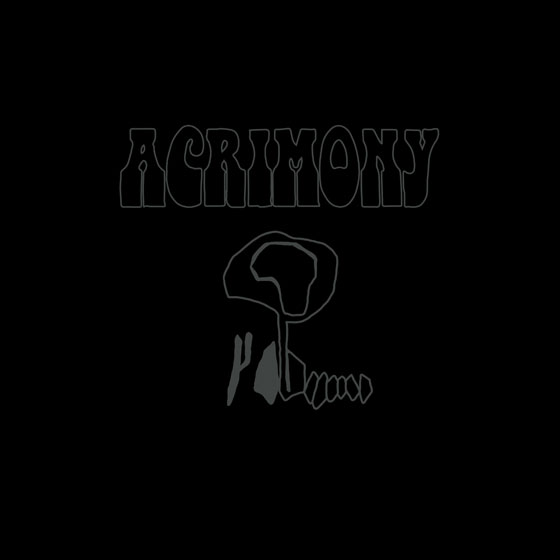
Tumuli is a tight space rocker, Satellite 19 is a kickass cosmic trip, and my favourite track on here, In Other Wor(l)ds, is a heavy ode to highness driven by bad ass, bad attitude heavy doom riffs. 100 New Gods is also awesome, with an almost pop vocal hook leading to more granite riffs and perhaps one of the best guitar leads to be heard in the entire Acrimony back catalogue. Timebomb!!! is a ripper, too. Often these compilations are only of passing interest, a chance for fans to hear rough demos, forgettable experiments, or ropey covers, but this disc is a great listen which gets better as it goes on.
Acrimony ‘Hymns To The Stone’
Originally released in 1994, Hymns To The Stone (Godhead Records) is the sound of a band still figuring itself out. That’s not to say that there are any missteps or glaring weaknesses. The whole thing sounds very confident, but Acrimony were brimming with so many ideas that they packed them all in and it seems they hadn’t fully developed everything to get to where they could. There’s clean picked guitars, psychedelic heavy vibes, fast headbanging riffs, languid smoked-out jams and laid back-leads, and vocals that switch from a distant cool, to a more hard-edged aggression and back again. A great sound but with even greater promise.
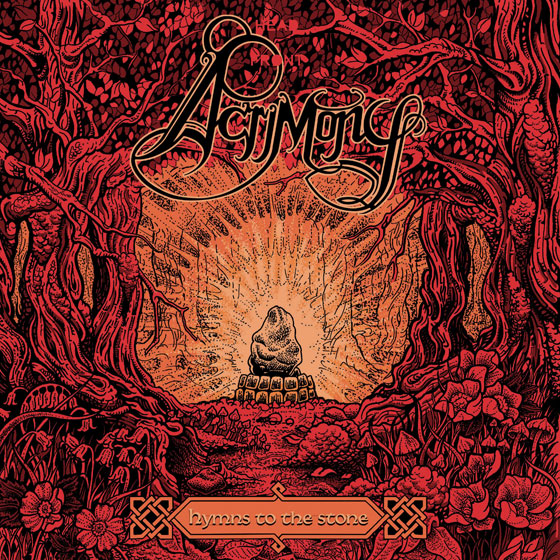
There’s a constant drive to this album and none of the songs hang around so there’s never a danger of long boring jams that go nowhere. Peaks and troughs, building and swelling, slow crawls and fast drives – there’s a lot to take in from the off. While the core of the band’s sound is a heavy psych riff fest, it’s intertwined with melody and different atmospheres, and not just the obvious clean guitar breaks. The start of Second Wind calls to mind the contemplation of another world, while in the middle of the track things grind to a chug with a chunky muted riff that sounds like classic Sleep.
The music is spacey but very British. Like that rural folksy sound that comes through in the first three Sabbath albums when they’re not channelling industrial Birmingham. But it’s not just about the Sabbath influence, because the same song showcases a signature part of the Acrimony sound that’s unique to them – the building anthemic wig out chants like ‘can you feel it?’ It’s a good time and sounds hopeful. It’s heavy, but it’s not drab.
The songs soar, with plenty of pounding riffs, wah excursions, quirky moments (like cowbell), and a unique world conjured by the creativity of the otherworldly lyrics…
The songs soar, with plenty of pounding riffs, wah excursions, quirky moments (like cowbell), and a unique world conjured by the creativity of the otherworldly lyrics. Often, psychedelic bands get lost and the music stops being urgent or exciting or heavy, but like Hawkwind, Acrimony never let up the riffs or energy, letting the psych vibes come along for the trip rather than derailing it.
Perhaps surprisingly, the album is relatively to-the-point. A lot of the songs are three or four minutes in length – but still packed full of riffs. It’s a great introduction to Acrimony and a perfect set-up for what’s to come, especially with Whatever, the longest track on the album. A wash of solar wah and desert engine sounds that show the band exploring what they can do when they give the songs more space to roam. This would be the approach they would further develop on their second album.
Acrimony ‘Tumuli Shroomaroom’
If their first album, Hymns To The Stone, sounded like Acrimony were reaching for something, their second album Tumuli Shroomaroom (1997, Peaceville Records) shows right away that they got it. It seems as if they found the sound they were looking for all along, and perhaps this is why the first track on Tumuli Shroomaroom is called Hymns To The Stone – like it’s what they were wanting to realise the first time round. Less frantic, this album has that assured sound of a band that knows what it wants to do and exactly how it wants to do it. This is a vibrant and uplifting odyssey. Each track is a rip-roaring trip laced with psychedelics to assist with a simultaneous combination of inner contemplation, mind expansion, and coming together. There’s that undeniable desert sound, but it’s a desert in space, setting foot on Mars after a head trip through the cosmos.
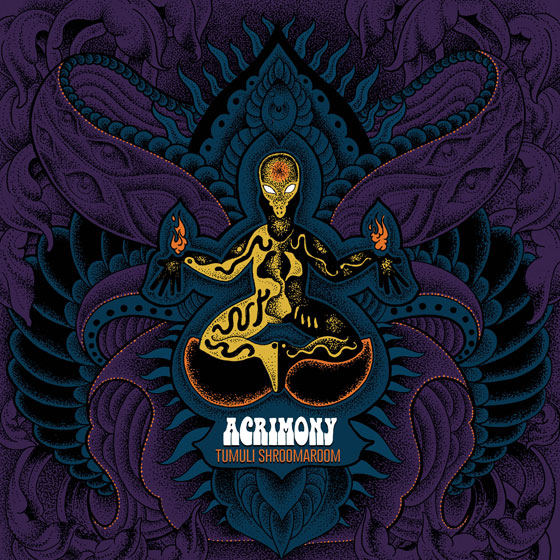
One of the most noticeable changes is with Dorian Walters vocals. At times a little harsh and less controlled on previous outputs, on Tumuli Shroomaroom he either soars or floats with an understated confidence that carries the songs in a way that becomes a seamless part of the journey. Less a series of rockers, this album is a series of meditations, searching for the self and each other through the dual conduits of heaviness and psychedelia.
Million Year Summer starts with a shamanistic intro before heading straight into a steady doom groove with fuzzed out guitars seamlessly incorporated into the song. With reversed and treated vocals, Acrimony reveal that the next step of their journey was more about subtle dynamic shifts from atmospheric ambience to epic anthemic heaviness. Turn The Page calls to mind Led Zeppelin at Bron-Yr-Aur. The extended guitar piece is majestic, folksy, and beautiful. It’s as if this is a distinct sound that only the Welsh countryside can evoke. A wash of fuzz jets prepare for take-off with Vy, as epic riffs and driving drums propel a tale of being swept off by celestial beings. On Find The Path, massive riffs eventually simmer down to a reflective state before everything erupts again.
For some, the immediate impression of Tumuli Shroomaroom is that it’s a jam album, and it certainly is one long trip, but there’s always someone at the controls. It’s spacey and far-reaching, sprawling and ambitious, but it never meanders. The drums are always driving the action and the guitars rarely let up.
The Bud Song sounds like a particularly potent strain, both mellow and heavy all at the same time. It’s intense but perfectly at ease as the band push through into dream worlds before their most Sabbathian moment with a vocal countdown leading to a stomping Master Of Reality-style riff complete with Ozzy-style ‘yeahs’and an invitation to get high atop the aether.
There’s that undeniable desert sound, but it’s a desert in space, setting foot on Mars after a head trip through the cosmos…
The epic Motherslug (The Mother Of All Slugs) is Acrimony at their most free and vital. This song shows what the band could have been and where they could have gone, the sound they could have shaped and the direction the scene might have taken had they continued. There’s no band in Doom that embody this positive spirit without letting up or losing their way. You just enjoy the experience and feel better for it afterwards. The way Motherslug takes in more experimental, experiential sounds is both mind expanding and thrilling, and what a way to finish – with smashing chords, ambience, and a didgeridoo.
Heavy Father tells of communion with God and the ‘spaceship of the mind’ through another endless supply of riffs. There’s further experimentation with vocal effects and arrangement, while album closer Firedance is a shamanistic ritual in full flight. One last epic trek through fire and light and sound. A transcendent message of love found through inner space closing with a wash of synths and chants in ode to the interconnected mind, body, and soul.
Acrimony played an important part in the story of British Doom, exploring something new during their formative years of fuzz and weed smoke. Like early Electric Wizard and Orange Goblin, there’s a familiarity to that sound of 90s Brit Doom Psychedelia which still sounds fresh. It’s the sound of young bands just setting out. It’s a shame that for whatever reason Acrimony never continued their trip because it’s not hard to imagine where they could have gone and how they could have developed. Even more dense and epic, spanning greater sonic territories, and further embracing the possibilities and potencies of both the mind and the riff.
Listening to them now, what sets their music apart and what makes it so special is that their heavy jams are life-affirming and celebratory. Everyone’s invited but it’s not just getting high and not caring, it’s a genuine, communal experience but in no way is it pretentious. It sounds like a force for good, and with just about every doom band these days copping out and giving up, focusing on nihilistic misery and how shit everything is, a band that invites everyone to come along and partake, explore and lose themselves together on the trip is a special thing.
Label: Burning World Records
Band Links: Facebook (unofficial)
Scribed by: Josuph Price

